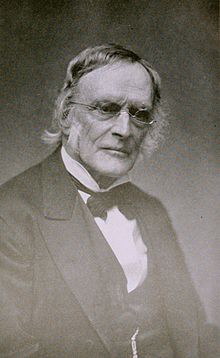Theodore Dwight Woolsey
| Theodore Dwight Woolsey | |
|---|---|
 |
|
| 10th President of Yale University | |
|
In office 1846–1871 |
|
| Preceded by | Jeremiah Day |
| Succeeded by | Noah Porter |
| Personal details | |
| Born | October 31, 1801 New York City, New York |
| Died | July 1, 1889 (aged 87) New Haven, Connecticut |
Theodore Dwight Woolsey (October 31, 1801 – July 1, 1889) was an American academic, author and President of Yale College from 1846 through 1871.
Theodore Dwight Woolsey was born October 31, 1801 in New York City. His mother was Elizabeth Dwight (1772–1813) and father was William Walton Woolsey (1766–1839). He graduated from Yale College in 1820, spent a year in legal study in Philadelphia, and two years of the study of theology at Princeton. For some time, he was a tutor at Yale, then went abroad to study Greek in Leipzig, Bonn, and Berlin. From 1831 to 1846 he was professor of Greek at Yale. His mother's brother Timothy Dwight (1752–1817) had been president of Yale 1795–1817. Jeremiah Day was the only president Yale had in between the family members. He was elected an Associate Fellow of the American Academy of Arts and Sciences in 1845. After being chosen as president of Yale, he instructed students of history, political economy, political science, and especially international law. He resigned as president of Yale in 1871. After Noah Porter served as president, the office was back in the family as his cousin once removed Timothy Dwight V (1828–1916), was selected in 1886.
During his 25 years as president, Yale advanced in wealth and influence and two new departments, the Scientific School and the School of Fine Arts, were begun. Woolsey was one of the founders of the New Englander, chairman of the American commission for the revision of the Authorized Version of the Bible, president of the World's Evangelical Alliance at its international meeting in New York, a lifelong member and at one time president of the American Oriental Society, and a regent of the Smithsonian Institution. Among his writings and publications are these: Editions of the Alcestis of Euripides (1834), of the Antigone of Sophocles (1835), of the Prometheus of Æschylus (1837), of the Electra of Sophocles (1837), and of the Gorgias of Plato (1843); an edition of Lieber's Civil liberty and Self Government, and:
...
Wikipedia
